Review of Unmanned Aerial Vehicle Swarm Communication Architectures and Routing Protocols
Abstract
:1. Introduction
- Survivability: In a single-UAV system, it is considered a failure if a single-UAV is shot down during the mission. However, for multi-UAV systems, a single out of control UAV is nothing serious because other UAVs will continue to operate.
- Scalability: Using large UAVs for single-UAV systems only increases coverage to a certain point. By contrast, multi-UAV systems can easily increase the range of operations [15].
- Autonomy: For single-UAV systems, the typical mode of operation is that the pilot on the ground has direct real-time control of all aircraft systems. For most multi-UAV systems, the onboard automation ensures controlled flight in accordance with flight plans and other directives received from infrastructures [18].
- Cost: Research shows that missions can be completed at lower costs when multi-UAV systems are used.
- Communication needs: Single-UAV systems need to maintain communication with the ground pilots or infrastructures at all times. By contrast, a multi-UAV system has only one specific UAV that communicates with the ground and forwards the message to other UAVs.
- Radar cross-section: For military applications, multi-UAV systems produce only a small radar cross-section, which enhances the security of military operations [19].
- U-T-U communication: all UAVs in the swarm establish efficient communication which allows the information to be obtained and exchanged through sensors or radar. Two UAVs can either communicate with each other directly, or indirectly by construct multi-hop communication paths with other UAVs.
- U-T-I communication: UAVs communicate with the fixed central control center, such as a ground station, to obtain real-time mission information. U-T-I communication is usually a direct communication. In the rest of this article, we use infrastructure to represent the central control center.
2. Communication Architectures
2.1. Centralized Communication Architecture
2.2. Decentralized Communication Architecture
2.2.1. Single-Group Swarm Ad hoc Network
2.2.2. Multi-Group Swarm Ad hoc Network
2.2.3. Multi-layer Swarm Ad hoc Network
2.3. Remarks
3. Routing Protocols
3.1. Routing Technologies
- (1)
- Store-carry-forward technology: when no relay node can be found at a certain time, the current node will store and carry the datagram until it finds the forwarding node. This technology is suitable for intermittent network, but the disadvantage is that it produces a large delay.
- (2)
- Greedy forward technology: forwarding principle is to select the neighbor node closest to the destination as the relay node until the datagram is sent to the destination. It can be used in scenarios where the deployment of UAVs is intensive. However, when a node is closest to the destination and there is no path to neighbor node, it will cause a failure. In this case, it should be combined with other technologies to increase the reliability of the technology.
- (3)
- Path discover technology: the core is through the flooding of routing request (RREQ), maximizing the accessibility of the path. This technique reduces the likelihood of communication interruptions when the current node loses the destinated geographic location. But the disadvantage is that it consumes bandwidth resources excessively.
- (4)
- Single-path technology: characterized by the use of a single path for data transmission. Suitable for extremely limited bandwidth resources. However, it has the disadvantage of poor robustness. There is no alternative path for network failure, so it is easy to lose packets. This technique is rarely used in UAV swarm communication scenarios.
- (5)
- Multi-path technology: Multi-path propagation technology can effectively improve the robustness of the link. When one link fails, other links can take over. It is suitable for scenarios where high link reliability is required. The disadvantage is that when the multi-path intersections fail, the network will have a loop which will block the network.
- (6)
- Predictive routing technology: The predictive routing technology predicts the future position of a node by its current position, velocity and direction, and further chooses the next optimal hop node. This technology is applicable to scenarios where the positions of nodes change rapidly, so it is widely used in a UAV swarm Ad hoc network.
3.2. The Classification of Routing Protocols
3.3. Topology-Based Routing Protocols
3.3.1. Static Routing Protocols
3.3.2. Proactive Routing Protocols
3.3.3. Reactive Routing Protocols
3.3.4. Hybrid Routing Protocols
3.4. Geographic/Position-Based Routing Protocols
3.5. Swarm Intelligence-Based Routing Protocols
3.6. Remarks
4. Conclusions and Discussions
- (1)
- Multi-layer architecture can better adapt to the characteristics of the UAV swarm communication, but it also brings new challenges. Because of the importance of gateway UAVs in swarm communication, it is necessary to have the ability to detect the failure of gateway UAVs. Further, if malfunctions have occurred, there should be a reliable algorithm to select the next UAV to act as the gateway. At the same time, the data stored in fault gateway UAV should be able to synchronize to the standby one.
- (2)
- The fast-moving characteristic of UAVs and the frequent change of network topology may cause the swarm communication to be intermittently connected. It has always been one of the important issues with routing protocols. Therefore, the solution to the problem of intermittent connectivity will remain the focus of research in the future.
- (3)
- Currently, most proposed routing protocols focus on performance improvement. However, security is an important content that cannot be ignored in any communication network. Therefore, it is necessary to propose new routing solutions including security components.
- (4)
- Energy efficiency plays an important role in UAV networks with energy constraints. The concerns regarding power saving in the UAV networks are in some ways similar to that in mobile ad hoc networks and wireless sensor networks. Many energy-saving routing protocols have been tried for UAV networks, but the applicability of these protocols in different drone network scenarios has yet to be proven.
- (5)
- In addition, the UAV communication network should be compatible with other networks in specific mission scenarios. Therefore, the design of the new routing protocols should be able to effectively support the different transmission requirements in the diverse mission scenarios.
Author Contributions
Funding
Conflicts of Interest
Abbreviations
| AODV | Ad hoc On Demand Distance Vector |
| APAR | Ant colony optimization-based Polymorphism-Aware Routing |
| B.A.T.M.A.N. | Better Approach to Mobile Ad hoc Networking |
| BeeAdhoc | Bee colony algorithm based Ad hoc network |
| CAS | Close Air Support |
| DCR | Data Centric Routing |
| DOLSR | Directional Optimized Link State Routing |
| DREAM | Distance Routing Effect Algorithm for Mobility |
| DSDV | Destination-Sequenced Distance Vector |
| DSR | Dynamic Source Routing |
| GGF | Greedy Geographic Forwarding |
| GLS | Grid Location Services |
| GLSR | Geographic Load Share Routing |
| GPMOR | Geographic Position Mobility Oriented Routing |
| GPSR | Greedy Perimeter Stateless Routing |
| G-T-G | Group-to-Group |
| HLS | Hierarchical Location Services |
| HRP | Hybrid Routing Protocol |
| IAFSA | Improved Artificial Fish-swarm Algorithm |
| IP | Internet Protocol |
| LCAD | Load Carry and Deliver Routing |
| MLHR | Multilevel Hierarchical Routing |
| ML-OLSR | Mobility and Load-aware Optimized Link State Routing |
| MPGR | Mobility Prediction based Geographic Routing |
| MPR | Multiple Point Relay |
| OLSR | Optimized Link State Routing |
| PRP | Proactive Routing Protocol |
| QoS | Quality of Service |
| RE-DSR | Restrict Dynamic Source Routing |
| RGR | Reactive-Greedy-Reactive |
| RLS | Reactive Location Services |
| RREP | Route Reply |
| RREQ | Route Requests |
| RRP | Reactive Routing Protocol |
| SI | Swarm Intelligence |
| SPOF | Single Point of Failure |
| TC | Topology Control |
| TORA | Temporarily Ordered Routing Algorithm |
| UAV | Unmanned Aerial Vehicle |
| UE-DSR | UAV Energy Dynamic Source Routing |
| U-T-I | UAV-to-Infrastructure |
| U-T-U | UAV-to-UAV |
| ZRP | Zone Routing Protocol |
References
- Manathara, J.G.; Sujit, P.B.; Sousa, J. Search Strategies for Multiple UAV Search and Destroy Missions. J. Intell. Robot. Syst. 2010, 61, 355–367. [Google Scholar] [CrossRef]
- Sun, Z.; Wang, P.; Vuran, M.C.; Al-Rodhaan, M.; Al-Dhelaan, A.; Akyildiz, I.F. BorderSense: Border patrol through advanced wireless sensor networks. Ad Hoc Netw. 2011, 9, 468–477. [Google Scholar] [CrossRef] [Green Version]
- Rosati, S.; Krużelecki, K.; Traynard, L.; Mobile, B.R. Speed-aware routing for UAV ad-hoc networks. In Proceedings of the 2013 IEEE Globecom Workshops (GC Wkshps), Atanta, GA, USA, 9–13 December 2013; IEEE: New York, NY, USA, 2013; pp. 1367–1373. [Google Scholar]
- Erdelj, M.; Chowdhury, K.R.; Akyildiz, I.F.; Natalizio, E. Help from the Sky: Leveraging UAVs for Disaster Management. IEEE Pervasive Comput. 2017, 16, 24–32. [Google Scholar] [CrossRef]
- Beard, R.W.; McLain, T.W.; Nelson, D.B.; Kingston, D.; Johanson, D. Decentralized cooperative aerial surveillance using fixed-wing miniature UAVs. Proc. IEEE 2006, 94, 1306–1324. [Google Scholar] [CrossRef] [Green Version]
- Barrado, C.; Meseguer-Pallarés, R.; Lopez, J.; Pastor, E.; Santamaria, E.; Royo, P. Wildfire monitoring using a mixed air-ground mobile network. IEEE Pervasive Comput. 2010, 9, 24–32. [Google Scholar] [CrossRef]
- Cho, A.; Kim, J.; Lee, S.; Kee, C. Wind Estimation and Airspeed Calibration using a UAV with a Single-Antenna GPS Receiver and Pitot Tube. IEEE Trans. Aerosp. Electron. Syst. 2011, 47, 109–117. [Google Scholar] [CrossRef]
- Maza, I.; Caballero, F.; Capitán, J.; De-Dios, J.R.M.; Ollero, A. Experimental Results in Multi-UAV Coordination for Disaster Management and Civil Security Applications. J. Intell. Robot. Syst. 2010, 61, 563–585. [Google Scholar] [CrossRef]
- Xiang, H.; Tian, L. Development of a low-cost agricultural remote sensing system based on an autonomous unmanned aerial vehicle (UAV). Biosyst. Eng. 2011, 108, 174–190. [Google Scholar] [CrossRef]
- Semsch, E.; Jakob, M.; Pavlicek, D.; Pechoucek, M. Autonomous UAV surveillance in complex urban environments. In Proceedings of the 2009 IEEE/WIC/ACM International Joint Conference on Web Intelligence and Intelligent Agent Technology, Milan, Italy, 15–18 September 2009; IEEE: New York, NY, USA, 2009; Volume 2, pp. 82–85. [Google Scholar]
- De Freitas, E.P.; Heimfarth, T.; Netto, I.F.; Lino, C.E.; Pereira, C.E.; Ferreira, A.M.; Wagner, F.R.; Larsson, T. UAV relay network to support WSN connectivity. In Proceedings of the International Congress on Ultra Modern Telecommunications and Control Systems, Dublin, Ireland, 28–30 October 2010; IEEE: New York, NY, USA, 2010; pp. 309–314. [Google Scholar]
- Jiang, F.; Swindlehurst, A.L. Dynamic UAV relay positioning for the ground-to-air uplink. In Proceedings of the 2010 IEEE Globecom Workshops, Miami, FL, USA, 6 December 2010; IEEE: New York, NY, USA, 2010; pp. 1766–1770. [Google Scholar]
- Adams, S.M.; Friedland, C.J. A Survey of Unmanned Aerial Vehicle (UAV) Usage for Imagery Collection in Disaster Research and Management. In Proceedings of the 9th International Workshop on Remote Sensing for Disaster Response; 2011; Volume 8. Available online: https://www.researchgate.net/publication/266465037_A_Survey_of_Unmanned_Aerial_Vehicle_UAV_Usage_for_Imagery_Collection_in_Disaster_Research_and_Management (accessed on 31 January 2011).
- Liu, X.; Yin, D.; Zhou, Y.; Liu, Z.; Wang, Y. Dispatching and management methods for communication of UAV swarm. In Proceedings of the 2nd International Conference on High Performance Compilation, Computing and Communications, New York, NY, USA, 15–17 March 2018; pp. 61–67. [Google Scholar]
- Morse, B.S.; Engh, C.H.; Goodrich, M.A. UAV video coverage quality maps and prioritized indexing for wilderness search and rescue. In Proceedings of the 2010 5th ACM/IEEE International Conference on Human-Robot Interaction (HRI), Osaka, Japan, 2–5 March 2010; IEEE: New York, NY, USA, 2010; pp. 227–234. [Google Scholar]
- Yanmaz, E.; Costanzo, C.; Bettstetter, C.; Elmenreich, W. A discrete stochastic process for coverage analysis of autonomous UAV networks. In Proceedings of the 2010 IEEE Globecom Workshops, Miami, FL, USA, 6 December 2010; IEEE: New York, NY, USA, 2010; pp. 1777–1782. [Google Scholar]
- Sahingoz, O.K. Networking Models in Flying Ad-Hoc Networks (FANETs): Concepts and Challenges. J. Intell. Robot. Syst. 2013, 74, 513–527. [Google Scholar] [CrossRef]
- Valavanis, K.P.; Vachtsevanos, G.J. Handbook of Unmanned Aerial Vehicles; Springer: Berlin/Heidelberg, Germany, 2015; Volume 1. [Google Scholar]
- To, L.; Bati, A.; Hilliard, D. Radar cross section measurements of small unmanned air vehicle systems in non-cooperative field environments. In Proceedings of the 2009 3rd European Conference on Antennas and Propagation, Berlin, Germany, 23–27 March 2009; IEEE: New York, NY, USA, 2009; pp. 3637–3641. [Google Scholar]
- Tahir, A.; Böling, J.; Haghbayan, M.-H.; Toivonen, H.T.; Plosila, J. Swarms of Unmanned Aerial Vehicles—A Survey. J. Ind. Inf. Integr. 2019, 16, 100106. [Google Scholar] [CrossRef]
- Parunak, H.V.D.; Brueckner, S.; Odell, J. Swarming coordination of multiple UAV’s for collaborative sensing. In Proceedings of the 2nd AIAA “Unmanned Unlimited” Conference and Workshop & Exhibit, San Diego, CA, USA, 15–18 September 2003; p. 6525. [Google Scholar]
- Varela, G.; Caamaño, P.; Orjales, F.; Deibe, A.; Lopez-Pena, F.; Duro, R.J. Swarm intelligence based approach for real time UAV team coordination in search operations. In Proceedings of the 2011 Third World Congress on Nature and Biologically Inspired Computing, Salamanca, Spain, 19–21 October 2011; IEEE: New York, NY, USA, 2011; pp. 365–370. [Google Scholar]
- Weaver, J.N.; Arroyo, A.A.; Schwartz, E.M. Collaborative coordination and control for an implemented heterogeneous swarm of uavs and ugvs. Unpubl. Dr. Diss. 2014. Available online: https://www.mil.ufl.edu/publications/PhD_Dissertation_Joshua_Weaver.pdf (accessed on 8 May 2014).
- Zhu, X.; Liu, Z.; Yang, J. Model of Collaborative UAV Swarm Toward Coordination and Control Mechanisms Study. Procedia Comput. Sci. 2015, 51, 493–502. [Google Scholar] [CrossRef] [Green Version]
- McCune, R.; Purta, R.; Dobski, M.; Jaworski, A.; Madey, G.; Madey, A.; Wei, Y.; Blake, M.B. Investigations of dddas for command and control of uav swarms with agent-based modeling. In Proceedings of the 2013 Winter Simulations Conference (WSC), Washongtong, DC, USA, 8 December 2013; IEEE: New York, NY, USA, 2013; pp. 1467–1478. [Google Scholar]
- He, L.; Bai, P.; Liang, X.; Zhang, J.; Wang, W. Feedback formation control of UAV swarm with multiple implicit leaders. Aerosp. Sci. Technol. 2018, 72, 327–334. [Google Scholar] [CrossRef]
- Akram, R.N.; Markantonakis, K.; Mayes, K.; Habachi, O.; Sauveron, D.; Steyven, A.; Chaumette, S. Security, privacy and safety evaluation of dynamic and static fleets of drones. In Proceedings of the 2017 IEEE/AIAA 36th Digital Avionics Systems Conference (DASC), St. Petersburg, FL, USA, 17–21 September 2017; IEEE: New York, NY, USA, 2017; pp. 1–12. [Google Scholar]
- Bürkle, A.; Segor, F.; Kollmann, M. Towards Autonomous Micro UAV Swarms. J. Intell. Robot. Syst. 2010, 61, 339–353. [Google Scholar] [CrossRef]
- Sharma, R.; Ghose, D. Collision avoidance between UAV clusters using swarm intelligence techniques. Int. J. Syst. Sci. 2009, 40, 521–538. [Google Scholar] [CrossRef]
- Lamont, G.B.; Slear, J.N.; Melendez, K. UAV swarm mission planning and routing using multi-objective evolutionary algorithms. In Proceedings of the 2007 IEEE Symposium on Computational Intelligence in Multi-Criteria Decision-Making, Honolulu, HI, USA, 1–5 April 2007; IEEE: New York, NY, USA, 2007; pp. 10–20. [Google Scholar]
- Sampedro, C.; Bavle, H.; Sanchez-Lopez, J.L.; Fernández, R.A.S.; Rodríguez-Ramos, A.; Molina, M.; Campoy, P. A flexible and dynamic mission planning architecture for uav swarm coordination. In Proceedings of the 2016 International Conference on Unmanned Aircraft Systems (ICUAS), Arlington, VA, USA, 15 September 2016; IEEE: New York, NY, USA, 2016; pp. 355–363. [Google Scholar]
- Wei, Y.; Madey, G.R.; Blake, M.B. Agent-based simulation for UAV swarm mission planning and execution. In Proceedings of the Agent-Directed Simulation Symposium, San Diego, CA, USA, 7 April 2013; pp. 1–8. [Google Scholar]
- Zettl, K.; Muhammad, S.S.; Chlestil, C.; Leitgeb, E.; Friedl, A.; Schmitt, N.; Rehm, W. High bit rate optical wireless systems for swarm unmanned aerial vehicles: A feasibility study. Mediterr. J. Comput. Netw. 2007, 3, 142–150. [Google Scholar]
- Jawhar, I.; Mohamed, N.; Al-Jaroodi, J.; Agrawal, D.P.; Zhang, S. Communication and networking of UAV-based systems: Classification and associated architectures. J. Netw. Comput. Appl. 2017, 84, 93–108. [Google Scholar] [CrossRef]
- Khan, M.A.; Safi, A.; Qureshi, I.M.; Khan, I.U. Flying ad-hoc networks (FANETs): A review of communication architectures, and routing protocols. In Proceedings of the 2017 First International Conference on Latest trends in Electrical Engineering and Computing Technologies (IN℡LECT), Saidia, Morocco, 15–17 April 2017; IEEE: New York, NY, USA, 2017; pp. 1–9. [Google Scholar]
- Cao, Y.; Yu, W.; Ren, W.; Chen, G. An Overview of Recent Progress in the Study of Distributed Multi-Agent Coordination. IEEE Trans. Ind. Inform. 2012, 9, 427–438. [Google Scholar] [CrossRef] [Green Version]
- Chriki, A.; Touati, H.; Snoussi, H.; Kamoun, F. UAV-GCS Centralized Data-Oriented Communication Architecture for Crowd Surveillance Applications. In Proceedings of the 2019 15th International Wireless Communications & Mobile Computing Conference (IWCMC), Tangier, Morocco, 24–28 June 2018; IEEE: New York, NY, USA, 2019; pp. 2064–2069. [Google Scholar]
- Gupta, L.; Jain, R.; Vaszkun, G. Survey of Important Issues in UAV Communication Networks. IEEE Commun. Surv. Tutor. 2015, 18, 1123–1152. [Google Scholar] [CrossRef] [Green Version]
- Sahingoz, O.K. Mobile networking with UAVs: Opportunities and challenges. In Proceedings of the 2013 International Conference on Unmanned Aircraft Systems (ICUAS), Atlanta, GA, USA, 28–31 May 2013; IEEE: New York, NY, USA, 2013; pp. 933–941. [Google Scholar]
- Kaleem, Z.; Yousaf, M.; Qamar, A.; Ahmad, A.; Duong, T.Q.; Choi, W.; Jamalipour, A. UAV-Empowered Disaster-Resilient Edge Architecture for Delay-Sensitive Communication. IEEE Netw. 2019, 33, 124–132. [Google Scholar] [CrossRef]
- Sun, Y.; Mi, Z.; Wang, H.; Jiang, Y.; Zhao, N. Research on UAV Cluster Routing Strategy Based on Distributed SDN. In Proceedings of the 2019 IEEE 19th International Conference on Communication Technology (ICCT), Xi’an, China, 16–19 October 2019; IEEE: New York, NY, USA, 2019; pp. 1269–1274. [Google Scholar]
- Zhao, Z.; Braun, T. Topology control and mobility strategy for uav ad-hoc networks: A survey. In Proceedings of the Joint ERCIM eMobility and MobiSense Workshop, St Petersburg, Russia, 1 June 2012; pp. 27–32. [Google Scholar]
- De Souza, B.J.O.; Endler, M. Coordinating movement within swarms of UAVs through mobile networks. In Proceedings of the 2015 IEEE International Conference on Pervasive Computing and Communication Workshops (PerCom Workshops), St. Louis, MO, USA, 23–27 March 2015; IEEE: New York, NY, USA, 2015; pp. 154–159. [Google Scholar]
- Zafar, W.; Khan, B.M. Flying Ad-Hoc Networks: Technological and Social Implications. IEEE Technol. Soc. Mag. 2016, 35, 67–74. [Google Scholar] [CrossRef]
- Zhang, K.; Zhang, W.; Zeng, J.-Z. Preliminary study of routing and date integrity in mobile Ad hoc UAV network. In Proceedings of the 2008 International Conference on Apperceiving Computing and Intelligence Analysis, Chengdu, China, 13–15 December 2008; IEEE: New York, NY, USA, 2008; pp. 347–350. [Google Scholar]
- Fu, B.; DaSilva, L.A. A mesh in the sky: A routing protocol for airborne networks. In Proceedings of the MILCOM 2007-IEEE Military Communications Conference, Orlando, FL, USA, 29–31 October 2007; IEEE: New York, NY, USA, 2007; pp. 1–7. [Google Scholar]
- Shen, J.; Moh, S.; Chung, I. Routing protocols in delay tolerant networks: A comparative survey. In Proceedings of the 23rd International Technical Conference on Circuits/Systems, Computers and Communications (ITC-CSCC 2008), California, CA, USA, 26–31 October 2008; pp. 6–9. [Google Scholar]
- Le, M.; Park, J.-S.; Gerla, M. UAV assisted disruption tolerant routing. In Proceedings of the MILCOM 2006-2006 IEEE Military Communications Conference, Washington, DC, USA, 23–25 October 2006; IEEE: New York, NY, USA, 2006; pp. 1–5. [Google Scholar]
- Cheng, C.-M.; Hsiao, P.-H.; Kung, H.; Vlah, D. Maximizing throughput of UAV-relaying networks with the load-carry-and-deliver paradigm. In Proceedings of the 2007 IEEE Wireless Communications and Networking Conference, Hong Kong, China, 13–15 March 2007; IEEE: New York, NY, USA, 2007; pp. 4417–4424. [Google Scholar]
- De Jong, E. Flexible Data-Centric UAV Platform Eases Mission Adaptation. White Paper. Available online: http://wk.ixueshu.com/i-wlwx/8f45d985a8149351.html (accessed on 20 March 2009).
- Koller, A.; Johnson, E. Design, implementation, and integration of a publish/subscribe-like multi-UAV communication architecture. In Proceedings of the AIAA Modeling and Simulation Technologies Conference and Exhibit, Monterey, CA, USA, 5–8 August 2005; p. 6309. [Google Scholar]
- Bekmezci, I.; Sahingoz, O.K. Temel, Şamil Flying Ad-Hoc Networks (FANETs): A survey. Ad Hoc Netw. 2013, 11, 1254–1270. [Google Scholar] [CrossRef]
- Ko, J.; Mahajan, A.; Sengupta, R. A network-centric UAV organization for search and pursuit operations. In Proceedings of the IEEE Aerospace Conference, Big Sky, MT, USA, 9–16 March 2002; IEEE: New York, NY, USA, 2002; Volume 6, p. 6. [Google Scholar]
- López, J.; Royo, P.; Pastor, E.; Barrado, C.; Santamaria, E. A middleware architecture for unmanned aircraft avionics. In Proceedings of the 2007 ACM/IFIP/USENIX International Conference on Middleware Companion, Newport Beach, CA, USA, 1 November 2007; pp. 1–6. [Google Scholar]
- Liu, K.; Zhang, J.; Zhang, T. The clustering algorithm of UAV networking in near-space. In Proceedings of the 2008 8th International Symposium on Antennas, Propagation and EM Theory, Kun Ming, China, 2–5 November 2008; IEEE: New York, NY, USA, 2008; pp. 1550–1553. [Google Scholar]
- Jacquet, P.; Muhlethaler, P.; Clausen, T.; Laouiti, A.; Qayyum, A.; Viennot, L. Optimized link state routing protocol for ad hoc networks. In Proceedings of the IEEE International Multi Topic Conference, 2001. IEEE INMIC 2001. Technology for the 21st Century, Lahore, Pakistam, 30 December 2001; IEEE: New York, NY, USA, 2001; pp. 62–68. [Google Scholar]
- Singh, K.; Verma, A.K. Applying OLSR routing in FANETs. In Proceedings of the 2014 IEEE International Conference on Advanced Communications, Control and Computing Technologies, Bangalore, India, 6–7 January 2014; IEEE: New York, NY, USA, 2014; pp. 1212–1215. [Google Scholar]
- Singh, K.; Verma, A.K. Experimental analysis of AODV, DSDV and OLSR routing protocol for flying adhoc networks (FANETs). In Proceedings of the 2015 IEEE International Conference on Electrical, Computer and Communication Technologies (ICECCT), Tamilnadu, India, 5–7 March 2015; IEEE: New York, NY, USA, 2015; pp. 1–4. [Google Scholar]
- Vasiliev, D.S.; Meitis, D.S.; Abilov, A. Simulation-based comparison of AODV, OLSR and HWMP protocols for flying Ad Hoc networks. In Proceedings of the International Conference on Next Generation Wired/Wireless Networking, St. Petersburg, Russia, 27–28 August 2014; Springer: Berlin/Heidelberg, Germany, 2014; pp. 245–252. [Google Scholar]
- Alshbatat, A.I.; Dong, L. Cross layer design for mobile ad-hoc unmanned aerial vehicle communication networks. In Proceedings of the 2010 International Conference on Networking, Sensing and Control (ICNSC), Chicago, IL, USA, 10–12 April 2010; IEEE: New York, NY, USA, 2010; pp. 331–336. [Google Scholar]
- Alshabtat, A.I.; Dong, L.; Li, J.; Yang, F. Low latency routing algorithm for unmanned aerial vehicles ad-hoc networks. Int. J. Electr. Comput. Eng. 2010, 6, 48–54. [Google Scholar]
- Zheng, Y.; Wang, Y.; Li, Z.; Dong, L.; Jiang, Y.; Zhang, H. A Mobility and Load Aware OLSR Routing Protocol for UAV Mobile ad-hoc Networks. 2014. Available online: https://ieeexplore.ieee.org/document/6913628 (accessed on 2 October 2014).
- Bani, M.; Yassein, M.B.; Damer, A. Flying Ad-Hoc Networks: Routing Protocols, Mobility Models, Issues. Int. J. Adv. Comput. Sci. Appl. 2016, 7, 162–168. [Google Scholar] [CrossRef] [Green Version]
- Perkins, C.E.; Bhagwat, P. Highly dynamic Destination-Sequenced Distance-Vector routing (DSDV) for mobile computers. ACM SIGCOMM Comput. Commun. Rev. 1994, 24, 234–244. [Google Scholar] [CrossRef]
- Turnadereli, I.; Bekmezci, I. Performance comparison of MANET routing protocols for UAV ad hoc networks. In Proceedings of the International Symposium on Computing in Science & Engineering, Nakorn Pathom, Thailand, 4–6 September 2015; p. 169. [Google Scholar]
- Neumann, A.; Aichele, C.; Lindner, M.; Wunderlich, S. Better approach to mobile ad-hoc networking (BATMAN). IETF Draft 2008, 1–24. Available online: http://www.researchgate.net/publication/320172464_Better_approach_to_mobile_ad-hoc_networking_BATMAN (accessed on 1 October 2008).
- Sandhu, D.S.; Sharma, S. Performance evaluation of batman, DSR, OLSR routing protocols-A review. J. Inf. Oper. Manag. 2012, 3, 225. [Google Scholar]
- Murray, D.; Dixon, M.; Koziniec, T. An experimental comparison of routing protocols in multi hop ad hoc networks. In Proceedings of the 2010 Australasian Telecommunication Networks and Applications Conference, Auckland, New Zealand, 31 October–3 November 2010; IEEE: New York, NY, USA, 2010; pp. 159–164. [Google Scholar]
- Sharma, A.; Rajagopalan, N. A comparative study of BATMAN and OLSR routing protocols for MANETs. Int. J. Adv. Trends Comput. Sci. Eng. 2013, 2, 13–17. [Google Scholar]
- Habib, S.; Saleem, S.; Saqib, K.M. Review on MANET routing protocols and challenges. In Proceedings of the 2013 IEEE Student Conference on Research and Development, Putrajaya, Malaysia, 16–17 December 2013; IEEE: New York, NY, USA, 2013; pp. 529–533. [Google Scholar]
- Brown, T.X.; Doshi, S.; Jadhav, S.; Henkel, D.; Thekkekunnel, R.-G. A full scale wireless ad hoc network test bed. Proc. ISART’05 2005, 51–60. Available online: http://citeseerx.ist.psu.edu/viewdoc/summary?doi=10.1.1.121.2433 (accessed on 22 October 2018).
- Khare, V.R.; Wang, F.Z.; Wu, S.; Deng, Y.; Thompson, C. Ad-hoc network of unmanned aerial vehicle swarms for search & destroy tasks. In Proceedings of the 2008 4th International IEEE Conference Intelligent Systems, Varna, Bulgaria, 6–8 September 2008; IEEE: New York, NY, USA, 2008; Volume 1, pp. 6–65. [Google Scholar]
- Li, J.; Zhang, X.L.; Bao, J.H.; Geng, G.L. A Novel DSR-Based Protocol for Signal Intensive UAV Network. Appl. Mech. Mater. 2012, 241, 2284–2289. [Google Scholar] [CrossRef]
- Li, J.; Liu, X.C.; Pang, Y.F.; Zhu, W.W. A Novel DSR-Based Protocol for Small Reconnaissance UAV Ad Hoc Network. Appl. Mech. Mater. 2014, 568, 1272–1277. [Google Scholar] [CrossRef]
- Perkins, C.; Belding-Royer, E.; Das, S. RFC3561: Ad Hoc on-Demand Distance Vector (AODV) Routing; RFC: 2003. Available online: https://dl.acm.org/doi/pdf/10.17487/RFC3561 (accessed on 1 July 2003).
- Biomo, J.-D.M.M.; Kunz, T.; St-Hilaire, M. Routing in unmanned aerial ad hoc networks: Introducing a route reliability criterion. In Proceedings of the 2014 7th IFIP Wireless and Mobile Networking Conference (WMNC), Vilamoura, Portugal, 20–22 May 2014; IEEE: New York, NY, USA, 2014; pp. 1–7. [Google Scholar]
- Perkins, C. ZRP: A hybrid framework for routing in ad hoc networks. In Ad Hoc Networks; Addison-Wesley: Boston, MA, USA, 2001; pp. 221–254. [Google Scholar]
- Haas, Z. The zone routing protocol (ZRP) for ad hoc networks. IETF Internet Draft Draft-Ietf-Manet-Zone-Zrp-01 Txt 1998. Available online: https://tools.ietf.org/html/draft-ietf-manet-zone-zrp-01 (accessed on 1 August 1998).
- Zang, C.; Zang, S. Mobility prediction clustering algorithm for UAV networking. In Proceedings of the 2011 IEEE GLOBECOM Workshops (GC Wkshps), Houston, TX, USA, 5–9 December 2011; IEEE: New York, NY, USA, 2011; pp. 1158–1161. [Google Scholar]
- Park, V.D.; Corson, M.S. A performance comparison of the temporally-ordered routing algorithm and ideal link-state routing. In Proceedings of the Third IEEE Symposium on Computers and Communications. ISCC’98 (Cat. No. 98EX166), Athens, Greece, 30 June–2 July 1998; IEEE: New York, NY, USA, 1998; pp. 592–598. [Google Scholar]
- Käsemann, M.; Füßler, H.; Hartenstein, H.; Mauve, M. A reactive location service for mobile ad hoc networks. Tech. Rep. 2002, 2, 1–16. [Google Scholar]
- Li, J.; Jannotti, J.; De Couto, D.S.J.; Karger, D.R.; Morris, R. A scalable location service for geographic ad hoc routing. In Proceedings of the 6th Annual International Conference; Association for Computing Machinery (ACM), Boston, MA, USA, 6–11 August 2000; pp. 120–130. [Google Scholar]
- Karp, B.; Kung, H.T. GPSR: Greedy Perimeter Stateless Routing for Wireless Networks. In Proceedings of the GPSR: Greedy Perimeter Stateless Routing for Wireless Networks; Defense Technical Information Center (DTIC), Niagara Falls, Ont., Canada, 21–23 May 2007; pp. 243–254. [Google Scholar]
- Hyland, M.; Mullins, B.E.; Baldwin, R.O.; Temple, M.A. Simulation-based performance evaluation of mobile ad hoc routing protocols in a swarm of unmanned aerial vehicles. In Proceedings of the 21st International Conference on Advanced Information Networking and Applications Workshops (AINAW’07), Niagara Falls, Ont., Canada, 21–23 May 2007; IEEE: New York, NY, USA, 2007; Volume 2, pp. 249–256. [Google Scholar]
- Shirani, R.; St-Hilaire, M.; Kunz, T.; Zhou, Y.; Li, J.; Lamont, L. The performance of greedy geographic forwarding in unmanned aeronautical ad-hoc networks. In Proceedings of the 2011 Ninth Annual Communication Networks and Services Research Conference, Ottawa, ON, Canada, 2–5 May 2011; IEEE: New York, NY, USA, 2011; pp. 161–166. [Google Scholar]
- Medina, D.; Hoffmann, F.; Rossetto, F.; Rokitansky, C.-H. A Geographic Routing Strategy for North Atlantic In-Flight Internet Access Via Airborne Mesh Networking. IEEE/ACM Trans. Netw. 2011, 20, 1231–1244. [Google Scholar] [CrossRef] [Green Version]
- Medina, D.; Hoffmann, F.; Rossetto, F.; Rokitansky, C.-H. North atlantic inflight internet connectivity via airborne mesh networking. In Proceedings of the 2011 IEEE Vehicular Technology Conference (VTC Fall), San Francisco, CA, USA, 5–8 September 2011; IEEE: New York, NY, USA, 2011; pp. 1–5. [Google Scholar]
- Medina, D.; Hoffmann, F.; Rossetto, F.; Rokitansky, C.-H. A crosslayer geographic routing algorithm for the airborne internet. In Proceedings of the 2010 IEEE International Conference on Communications, Cape Town, South Africa, 23–27 May 2010; IEEE: New York, NY, USA, 2010; pp. 1–6. [Google Scholar]
- Medina, D.; Hoffmann, F.; Rossetto, F.; Rokitansky, C.-H. Routing in the airborne internet. In Proceedings of the 2010 Integrated Communications, Navigation, and Surveillance Conference, Hemdon, VA, USA, 11–13 May 2010; IEEE: New York, NY, USA, 2010; pp. A7-1–A7-10. [Google Scholar]
- Lin, L.; Sun, Q.; Wang, S.; Yang, F. A geographic mobility prediction routing protocol for ad hoc UAV network. In Proceedings of the 2012 IEEE Globecom Workshops, Anaheim, CA, USA, 3–7 December 2012; IEEE: New York, NY, USA, 2012; pp. 1597–1602. [Google Scholar]
- Lin, L.; Sun, Q.; Li, J.; Yang, F. A novel geographic position mobility oriented routing strategy for UAVs. J. Comput. Inf. Syst. 2012, 8, 709–716. [Google Scholar]
- Shirani, R.; St-Hilaire, M.; Kunz, T.; Zhou, Y.; Li, J.; Lamont, L. Combined reactive-geographic routing for unmanned aeronautical ad-hoc networks. In Proceedings of the 2012 8th International Wireless Communications and Mobile Computing Conference (IWCMC), Limassol, Cyprus, 27–31 August 2012; IEEE: New York, NY, USA, 2012; pp. 820–826. [Google Scholar]
- Taniuchi, K.; Ohba, Y.; Fajardo, V.; Das, S.; Tauil, M.; Cheng, Y.-H.; Dutta, A.; Baker, D.; Yajnik, M.; Famolari, D. IEEE 802.21: Media independent handover: Features, applicability, and realization. IEEE Commun. Mag. 2009, 47, 112–120. [Google Scholar] [CrossRef]
- Camp, T.; Boleng, J.; Williams, B.; Wilcox, L.; Navidi, W. Performance comparison of two location based routing protocols for ad hoc networks. In Proceedings of the Twenty-First Annual Joint Conference of the IEEE Computer and Communications Societies, New York, NY, USA, 23–27 June 2002; IEEE: New York, NY, USA, 2002; Volume 3, pp. 1678–1687. [Google Scholar]
- Wu, J.; Wang, J.; Cao, Y.; Cao, Y.; Shi, X. Research of Multi-UAVs Communication Range Optimization Based on Improved Artificial Fish-Swarm Algorithm. In Proceedings of the Industrial Engineering, Machine Design and Automation (IEMDA 2014) & Computer Science and Application (CCSA 2014) Proceedings of the 2014 Congress on IEMDA 2014 & Proceedings of the 2nd Congress on CCSA 2014, Sanya, China, 12–14 December 2014; pp. 98–104. [Google Scholar]
- Leonov, A.V. Application of bee colony algorithm for FANET routing. In Proceedings of the 2016 17th International Conference of Young Specialists on Micro/Nanotechnologies and Electron Devices (EDM), Erlagol, Russia, 30 June–4 July 2016; IEEE: New York, NY, USA, 2016; pp. 124–132. [Google Scholar]
- Yu, Y.; Ru, L.; Chi, W.; Liu, Y.; Yu, Q.; Fang, K. Ant colony optimization based polymorphism-aware routing algorithm for ad hoc UAV network. Multimed. Tools Appl. 2016, 75, 14451–14476. [Google Scholar] [CrossRef]
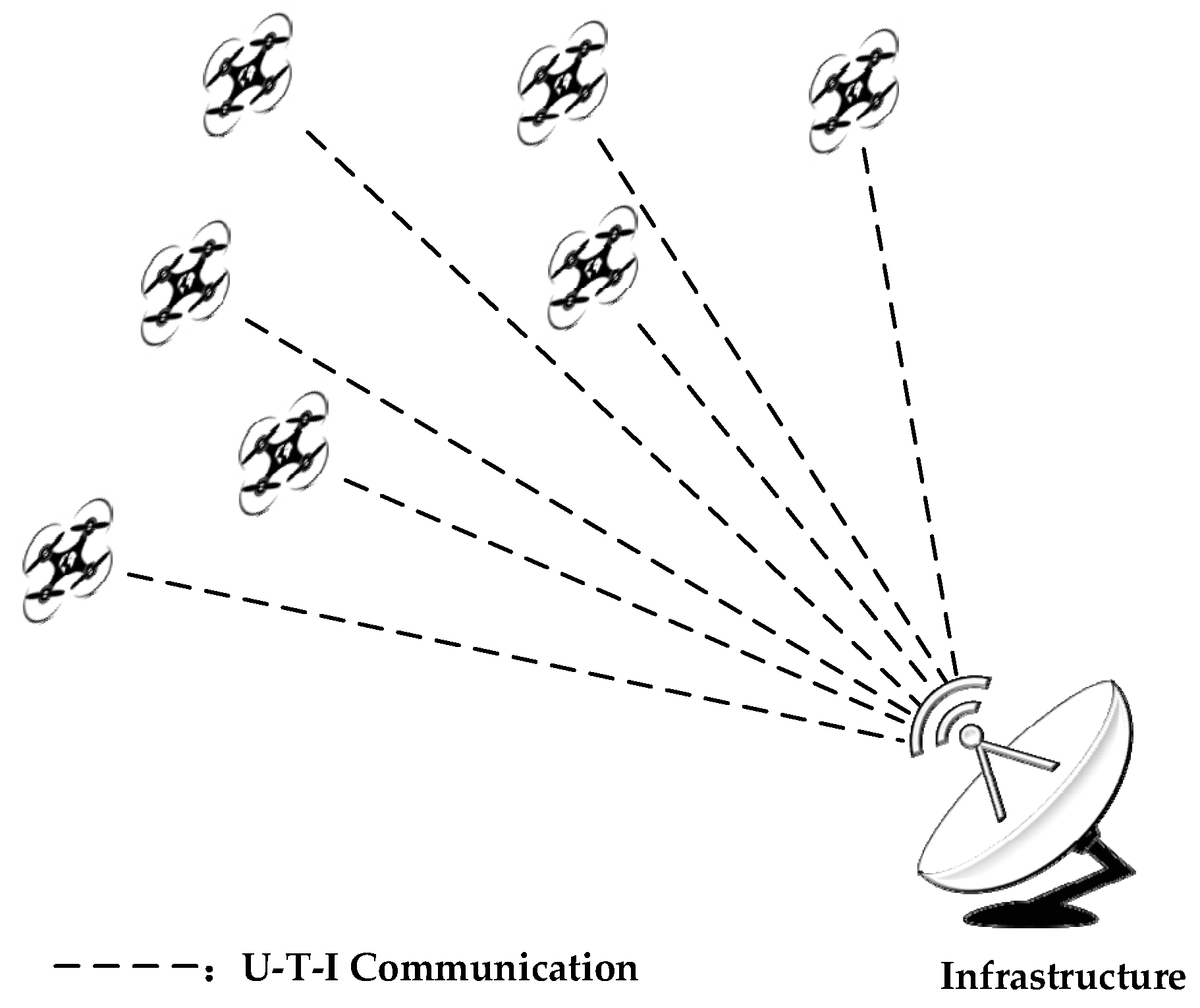
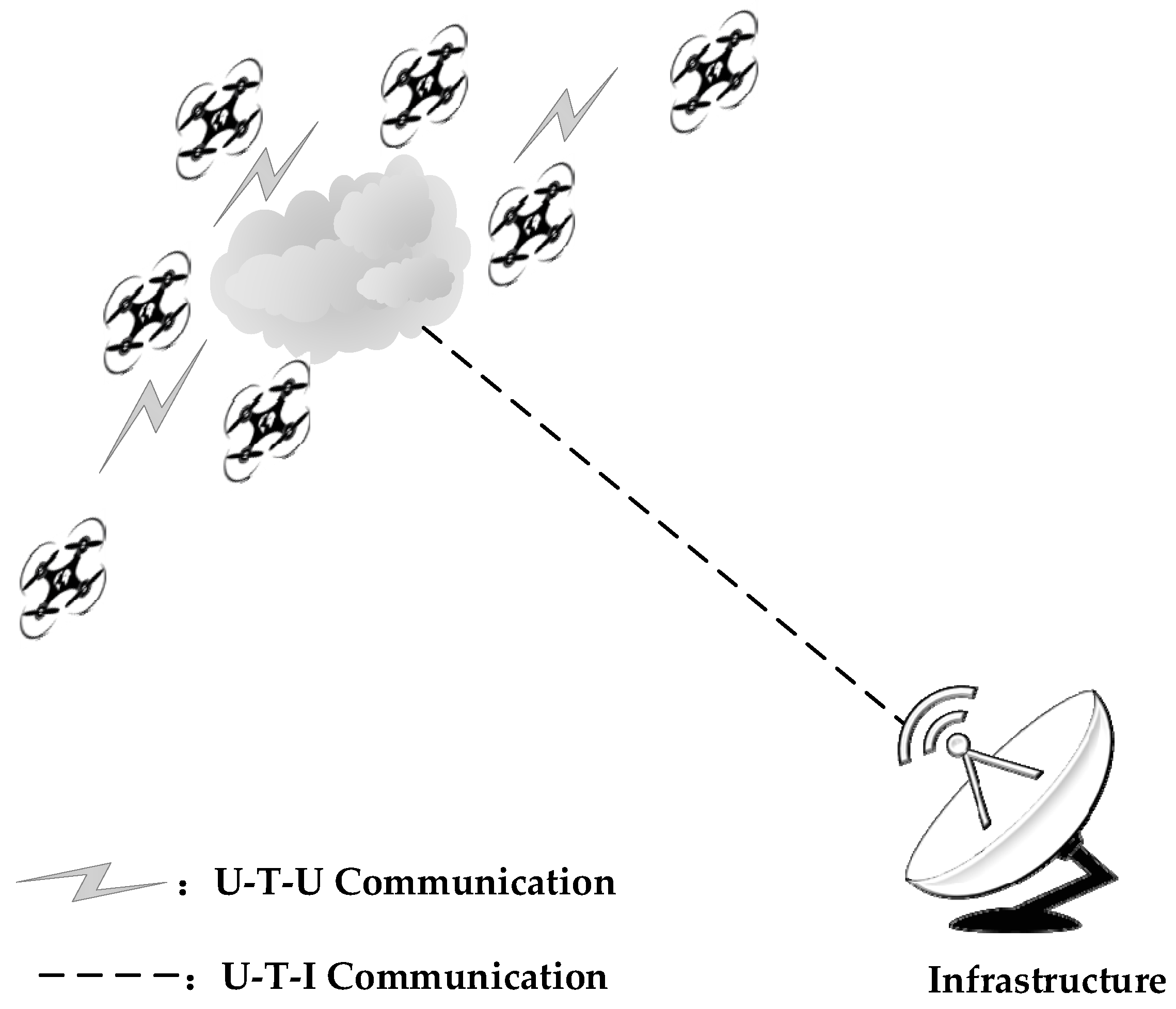
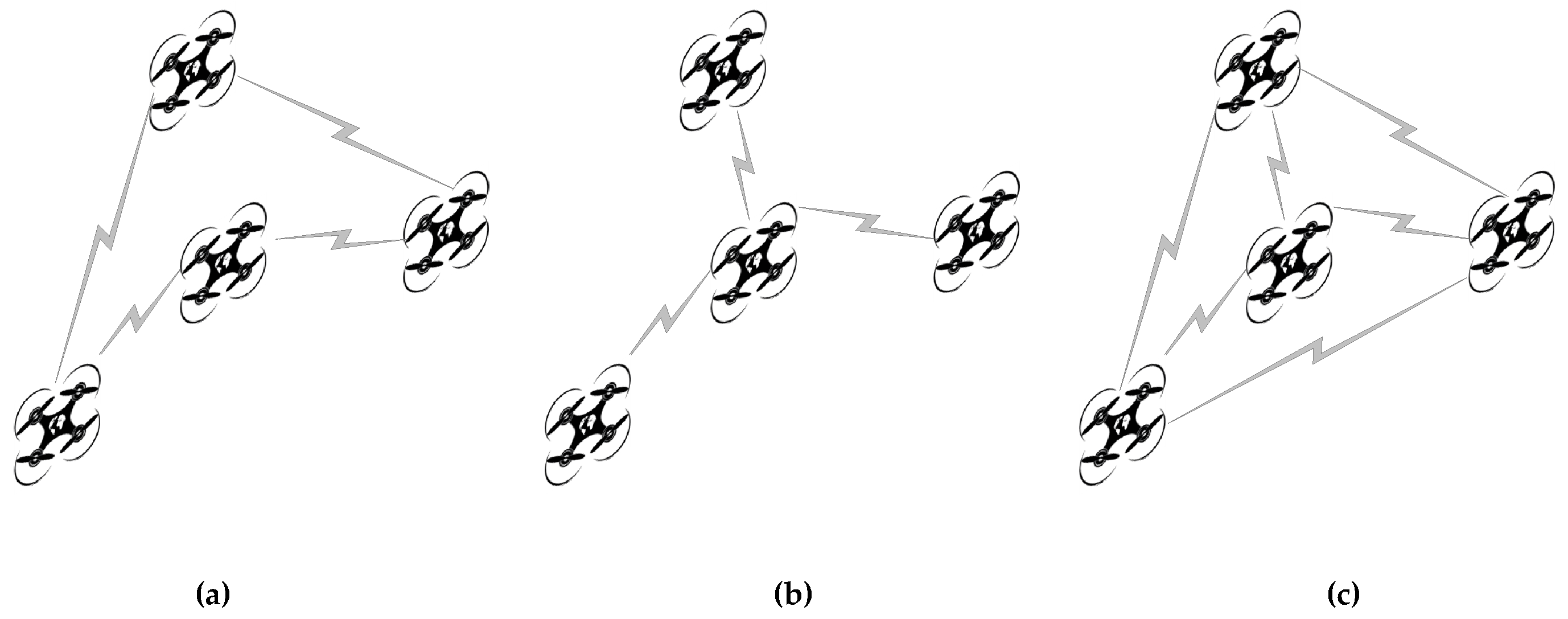
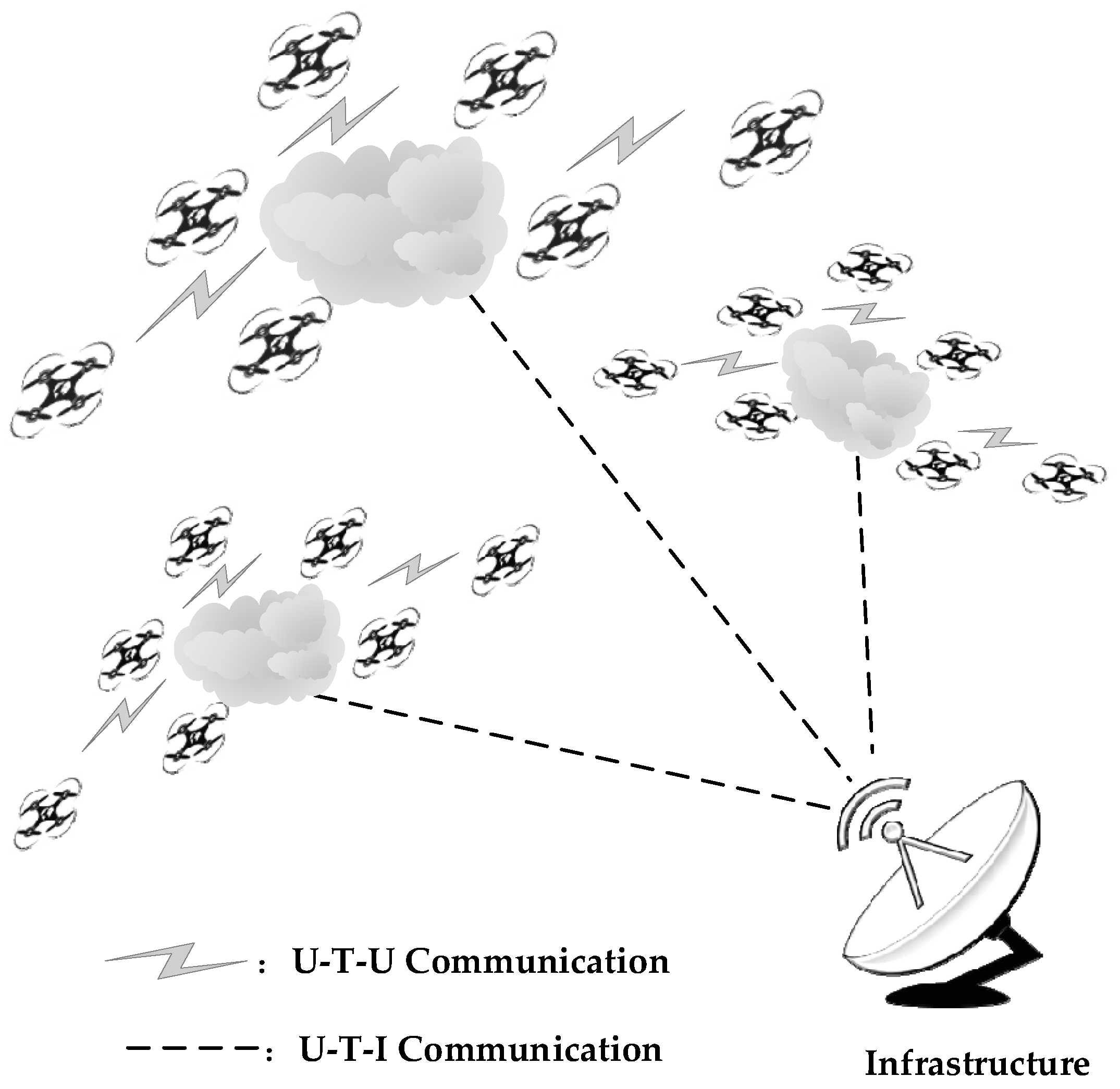
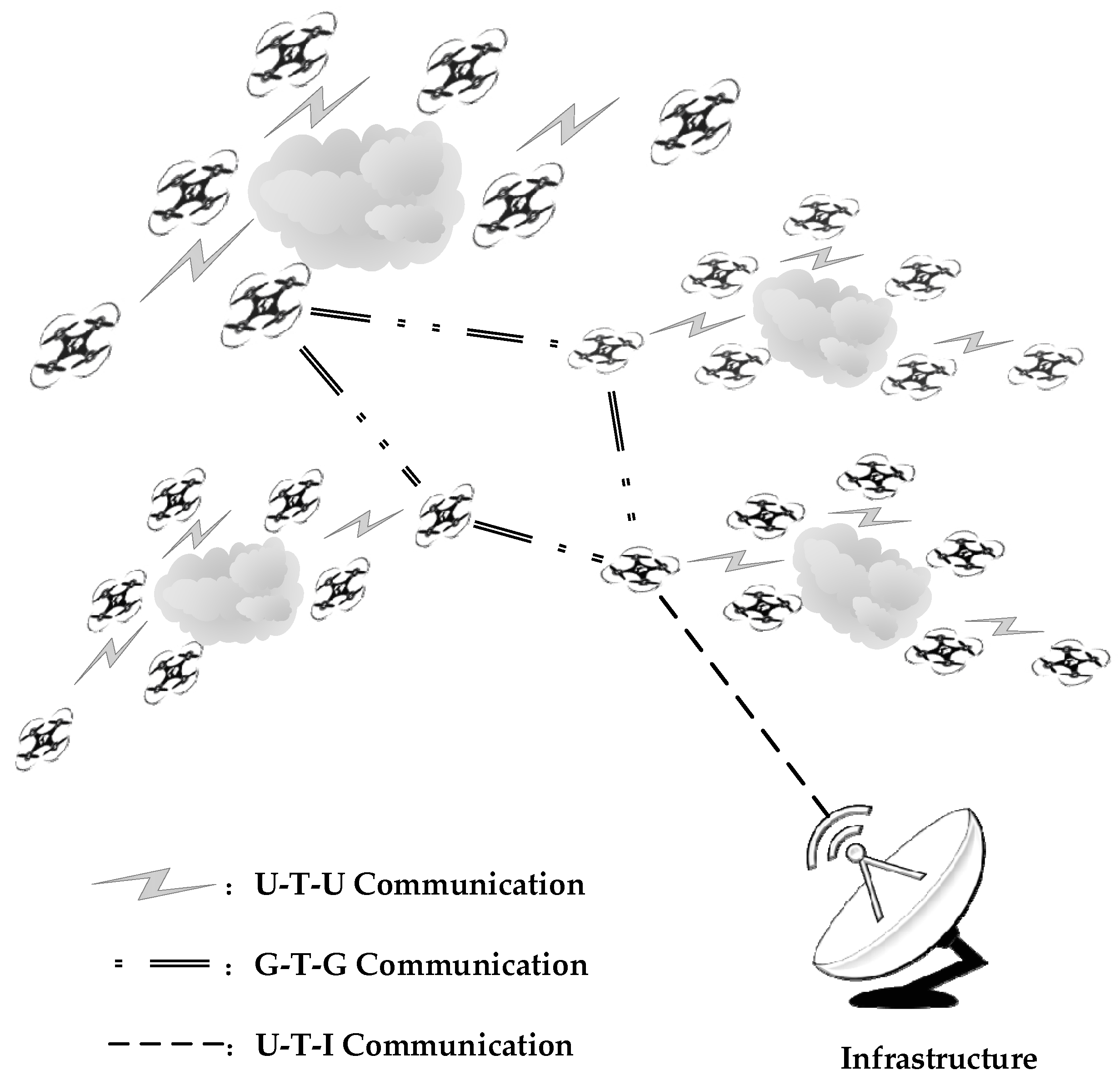
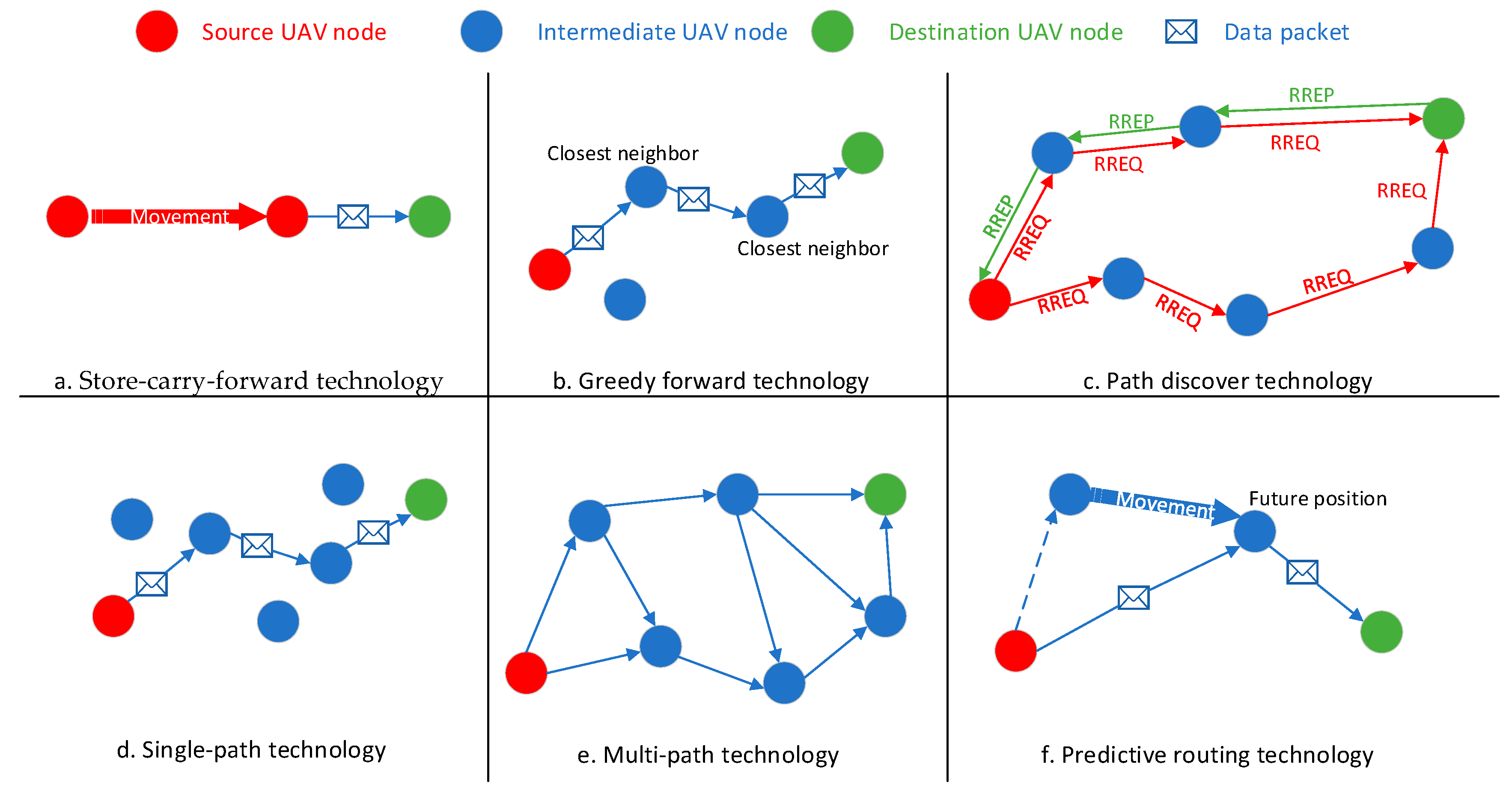
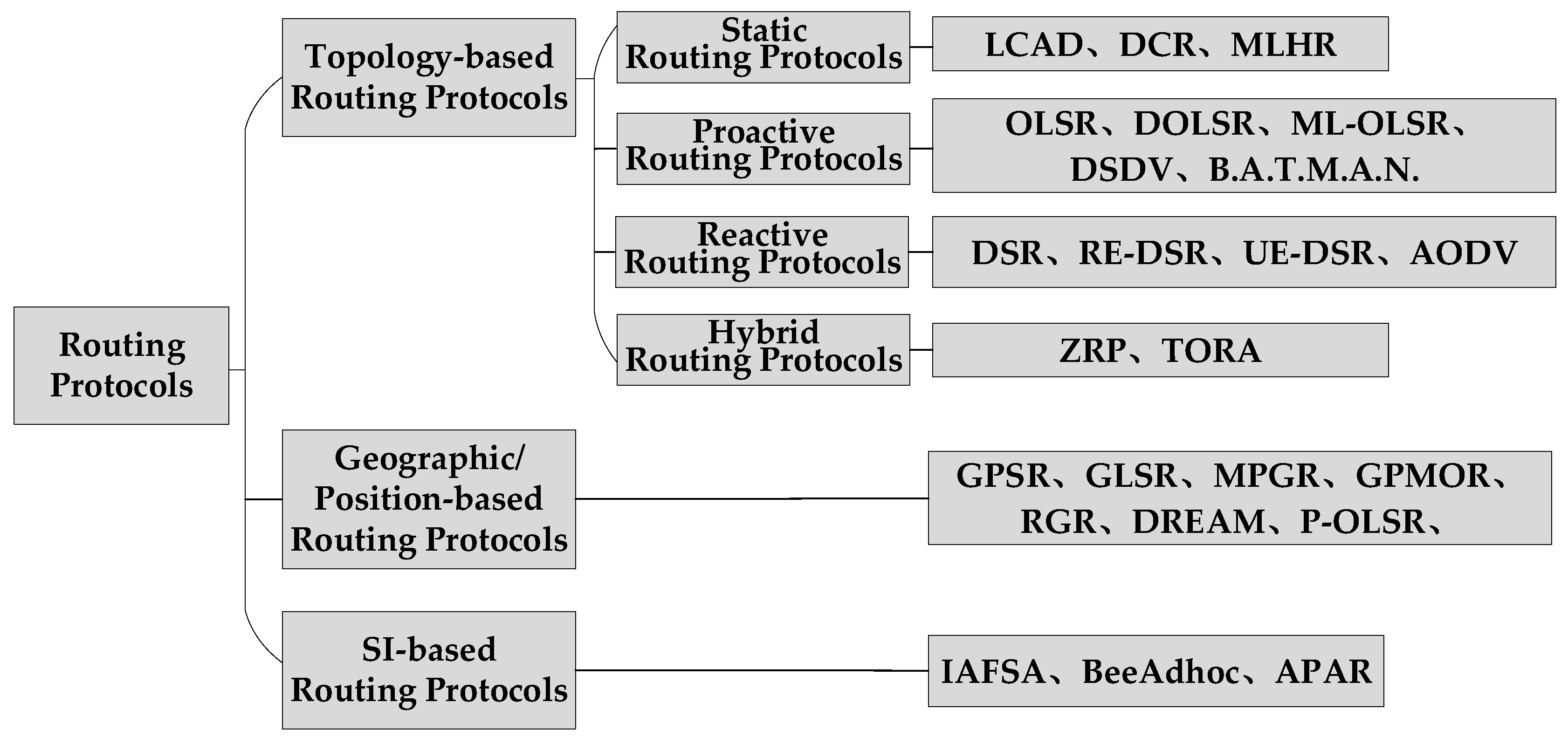
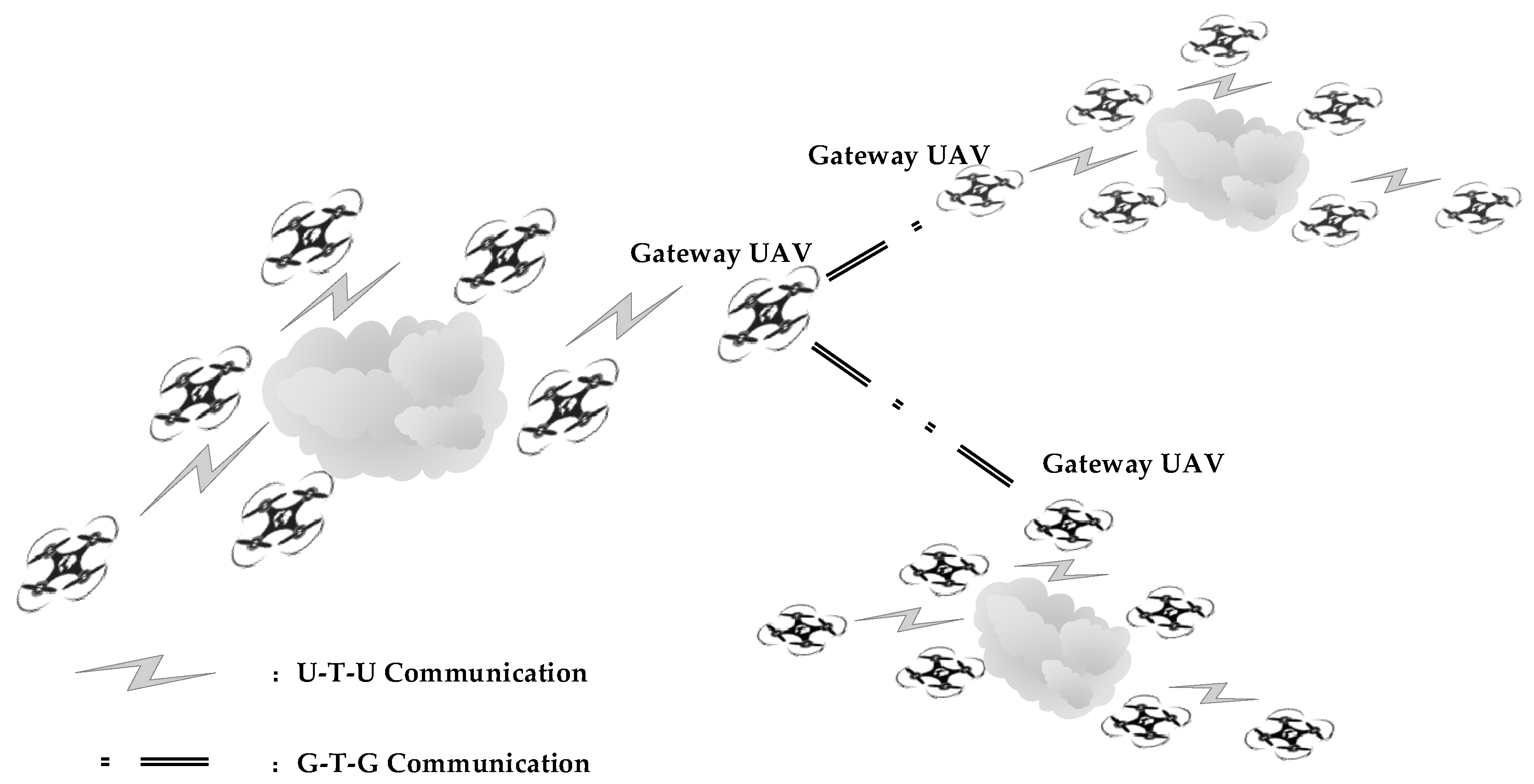
| Features | Single-UAV System | Multi-UAV System |
|---|---|---|
| Survivability | Poor | High |
| Scalability | Limited | High |
| Speed of mission | Slow | Fast |
| Autonomy | Low | High |
| Cost | High | Low |
| Communication needs | High | Low |
| Radar cross-sections | Large | Small |
| Features | Centralized Communication Architecture | Decentralized Communication Architecture | ||
|---|---|---|---|---|
| Single-Group | Multi-Group | Multi-Layer | ||
| Multi-hop Communication | × | √ | √ | √ |
| UAVs Relay Traffic | × | √ | √ | √ |
| Different Types of UAVs | × | × | √ | √ |
| Self-configuration | × | √ | × | √ |
| Limited Coverage | √ | √ | √ | × |
| Single Point of Failure | √ | × | √ | × |
| Robustness | √ | × | × | √ |
| Routing Protocols | Suitable for Dynamic Topology | Scalable | Packet Delivery Delays | Routing Finding Delays | Large Overhead | Routing Loops | Packet Loss | Link Failure | High Bandwidth | Location Services |
|---|---|---|---|---|---|---|---|---|---|---|
| Static | ||||||||||
| LCAD | × | × | √ | × | √ | √ | √ | √ | × | × |
| DCR | × | × | × | × | √ | √ | √ | √ | × | × |
| MLHR | × | √ | √ | × | √ | √ | √ | √ | × | √ |
| Proactive | ||||||||||
| OLSR | × | √ | √ | × | × | √ | √ | × | √ | × |
| DOLSR | × | √ | × | × | × | √ | √ | × | √ | × |
| ML-OLSR | × | √ | × | √ | × | √ | √ | × | √ | × |
| DSDV | × | √ | × | × | × | √ | √ | × | √ | × |
| B.A.T.M.A.N. | × | √ | × | × | × | √ | √ | × | √ | × |
| Reactive | ||||||||||
| DSR | √ | × | × | √ | √ | × | × | √ | √ | × |
| RE-DSR | √ | × | × | √ | × | × | × | √ | √ | × |
| UE-DSR | √ | × | × | √ | × | × | × | √ | √ | × |
| AODV | √ | × | × | √ | × | × | × | √ | √ | × |
| Hybrid | ||||||||||
| ZRP | × | √ | √ | × | × | × | × | × | × | × |
| TORA | × | √ | √ | × | × | × | × | × | × | × |
| Geographic/Position-based | ||||||||||
| GPSR | √ | √ | × | × | × | × | √ | × | × | √ |
| GLSR | √ | √ | × | × | × | × | √ | × | × | √ |
| MPGR | √ | √ | × | × | × | × | √ | × | × | √ |
| GPMOR | √ | √ | × | × | × | × | √ | × | × | √ |
| RGR | √ | √ | × | × | × | × | √ | × | × | √ |
| DREAM | × | √ | × | × | √ | √ | √ | × | √ | × |
| P-OLSR | √ | √ | × | √ | × | × | √ | × | √ | × |
| SI-based | ||||||||||
| IAFSA | √ | √ | × | × | × | × | √ | × | × | √ |
| BeeAdhoc | √ | √ | × | × | × | × | √ | × | × | √ |
| APAR | √ | √ | × | × | × | × | √ | × | × | √ |
© 2020 by the authors. Licensee MDPI, Basel, Switzerland. This article is an open access article distributed under the terms and conditions of the Creative Commons Attribution (CC BY) license (http://creativecommons.org/licenses/by/4.0/).
Share and Cite
Chen, X.; Tang, J.; Lao, S. Review of Unmanned Aerial Vehicle Swarm Communication Architectures and Routing Protocols. Appl. Sci. 2020, 10, 3661. https://doi.org/10.3390/app10103661
Chen X, Tang J, Lao S. Review of Unmanned Aerial Vehicle Swarm Communication Architectures and Routing Protocols. Applied Sciences. 2020; 10(10):3661. https://doi.org/10.3390/app10103661
Chicago/Turabian StyleChen, Xi, Jun Tang, and Songyang Lao. 2020. "Review of Unmanned Aerial Vehicle Swarm Communication Architectures and Routing Protocols" Applied Sciences 10, no. 10: 3661. https://doi.org/10.3390/app10103661




